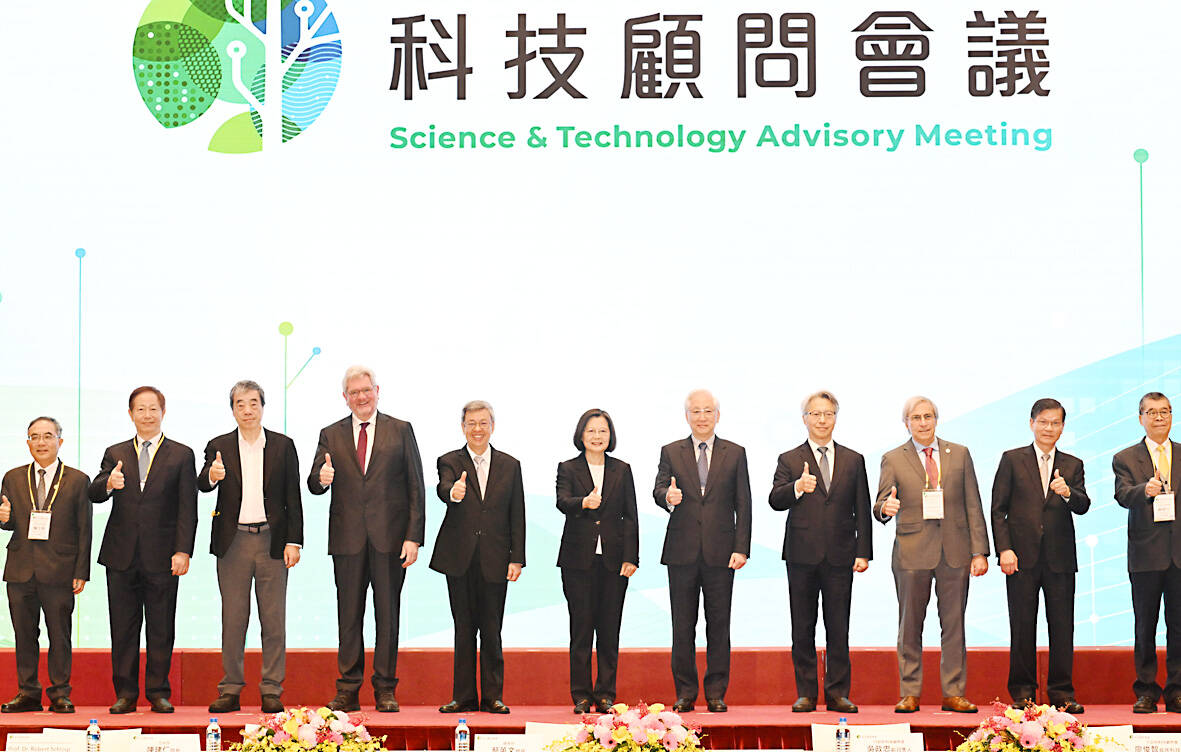The Executive Yuan yesterday resumed a high-level Science and Technology Advisory Board Meeting after a 12-year hiatus, as the government aims to seek recommendations from industry leaders to craft new strategies for the nation to enhance its global competitiveness over the next decade, the National Science and Technology Council (NSTC) said in a statement.
During the 31 meetings held between 1980 and 2011, the government had sought advice from science and technology experts to help build world-class industries from semiconductor and biological technology to information and communications technology, the statement said.
“We are now in an era where science and technology have become synonymous with national strength on a global scale,” President Tsai Ing-wen (蔡英文) said at the meeting in Taipei.

Photo: Tien Yu-hua, Taipei Times
The three-day meeting is to focus on two main themes — green technologies amid the global effort to move toward carbon neutrality and possible mutual enhancement between artificial intelligence (AI) and the semiconductor industry.
Premier Chen Chien-jen (陳建仁) and NSTC Minister Wu Tsung-tsong (吳政忠) are leading the meeting, while Academia Sinica President James Liao (廖俊智) is serving as the top technology adviser.
Meanwhile, Taiwan Semiconductor Manufacturing Co (台積電) chairman Mark Liu (劉德音) and MediaTek Inc chairman Rick Tsai (蔡明介) are among the advisers at this year’s meeting, along with National Taiwan University president Chen Wen-chang (陳文章), US Scripps Research Institute professor Wong Chi-huey (翁啟惠), Harvard University computer science professor Kung Hsiang-tsung (孔祥重).
Taiwan has built a resilient and comprehensive semiconductor supply chain not seen in the rest of the world. To safeguard that technology leadership, the NSTC has proposed spending NT$300 billion (US$9.52 billion) over the next 10 years on fostering semiconductor and AI start-ups, as well as creating bigger talent pools, the council said.
Chen Chien-jen said this year’s meeting would focus on green energy, and the semiconductor and AI technologies that are expected to have a major impact on society and its development in the next 10 to 20 years.
“We expect that the advisers’ professional and visionary advice, based on Taiwan’s own existing advantages, will bolster and ensure the continued prosperity of Taiwan’s tech sector,” he said, adding that next year’s budget for technology development is more than NT$150 billion, up 18 percent from this year.
The second day of the meeting is to focus on the net-zero industry, aiming to make Taiwan a model for the world, the council said.
Over the three days, the group would come up with both medium and long-term technology development strategies with the goal of helping Taiwan achieve the highest technical capabilities, it said.

UNCERTAINTY: Innolux activated a stringent supply chain management mechanism, as it did during the COVID-19 pandemic, to ensure optimal inventory levels for customers Flat-panel display makers AUO Corp (友達) and Innolux Corp (群創) yesterday said that about 12 to 20 percent of their display business is at risk of potential US tariffs and that they would relocate production or shipment destinations to mitigate the levies’ effects. US tariffs would have a direct impact of US$200 million on AUO’s revenue, company chairman Paul Peng (彭雙浪) told reporters on the sidelines of the Touch Taiwan trade show in Taipei yesterday. That would make up about 12 percent of the company’s overall revenue. To cope with the tariff uncertainty, AUO plans to allocate its production to manufacturing facilities in

Taiwan will prioritize the development of silicon photonics by taking advantage of its strength in the semiconductor industry to build another shield to protect the local economy, National Development Council (NDC) Minister Paul Liu (劉鏡清) said yesterday. Speaking at a meeting of the legislature’s Economics Committee, Liu said Taiwan already has the artificial intelligence (AI) industry as a shield, after the semiconductor industry, to safeguard the country, and is looking at new unique fields to build more economic shields. While Taiwan will further strengthen its existing shields, over the longer term, the country is determined to focus on such potential segments as

COLLABORATION: Given Taiwan’s key position in global supply chains, the US firm is discussing strategies with local partners and clients to deal with global uncertainties Advanced Micro Devices Inc (AMD) yesterday said it is meeting with local ecosystem partners, including Taiwan Semiconductor Manufacturing Co (TSMC, 台積電), to discuss strategies, including long-term manufacturing, to navigate uncertainties such as US tariffs, as Taiwan occupies an important position in global supply chains. AMD chief executive officer Lisa Su (蘇姿丰) told reporters that Taiwan is an important part of the chip designer’s ecosystem and she is discussing with partners and customers in Taiwan to forge strong collaborations on different areas during this critical period. AMD has just become the first artificial-intelligence (AI) server chip customer of TSMC to utilize its advanced

While China’s leaders use their economic and political might to fight US President Donald Trump’s trade war “to the end,” its army of social media soldiers are embarking on a more humorous campaign online. Trump’s tariff blitz has seen Washington and Beijing impose eye-watering duties on imports from the other, fanning a standoff between the economic superpowers that has sparked global recession fears and sent markets into a tailspin. Trump says his policy is a response to years of being “ripped off” by other countries and aims to bring manufacturing to the US, forcing companies to employ US workers. However, China’s online warriors